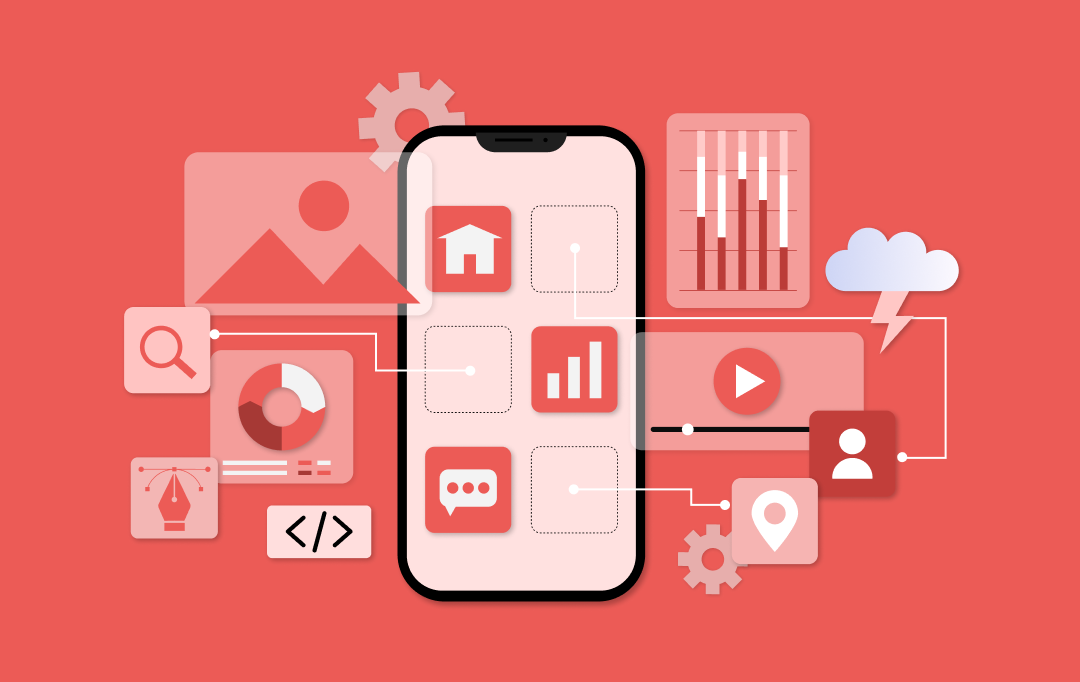- What is enterprise data warehouse?
- Enterprise data warehouse vs. usual data warehouse
- Architectural brief of an enterprise data warehouse
- Why your business needs enterprise data warehousing
- Why else use an enterprise data warehouse?
- Types of enterprise data warehouse solutions
- On-premises
- Cloud-hosted
- Hybrid
- How to evaluate enterprise data warehouses
- Self-service analytics software-
- Machine learning (ML) software-
- Data lake software-
- How Appinventiv can help you with enterprise data warehousing
“Where there is data smoke, there is business fire.”
-Thomas Redman, aka the Data doc (Advisor, innovator, author, data enthusiast)
Data impacts every business, regardless of what field you operate in or the scale of your enterprise. With data collection and analysis, companies get a better idea of what their users want, how frequently they want it, and what channels they prefer to avail the product or service. So you see how data collection and analysis can help create new opportunities for your business in every aspect.
Life without an enterprise data warehouse!
Experts in financial service practices say that the operational costs are detrimental from a bottom-line perspective. This means the cost and time you use to study data can be better utilized in serving customers.
The enormous amount of information and data is the biggest nightmare for enterprises.
Figuring out how to store, integrate and protect data to be accessed in a fluid way is honestly a task unless you know about data warehousing.
What is enterprise data warehouse?
Data warehouse, also known as Enterprise data warehouse (EDW), is a system utilized for data reporting and analysis and is said to be a core component of Business Intelligence (BI). It’s basically a decision support system that can store all your business’s historical data, process it, and use it for critical business decisions.
Now, the best part?
You get data in whichever form you want, be it dashboards or reports.
Moreover, the EDW system stores data from various sources in a structured format (CRM data, ERP data, receipts, OLTP data), etc. Further, this data is used for organizing and optimizing your business information efficiently.
So, we can say it’s practically an indispensable tool for any modern and scaling business. Wait till you read the exciting business benefits of enterprise data warehouses.
Enterprise data warehouse vs. usual data warehouse
Before we move forward, let’s not get confused between a usual data warehouse and an enterprise data warehouse.
A usual data warehouse is an extensive collection of any data set or information used explicitly for reporting and analysis. If so, what makes it any different from an enterprise data warehouse?
The actual difference lies in the enterprise data warehouse architecture. If we look at their architectural diversity, usual data warehouses are small databases that gather and store data from specific business units (E.g., customer support, sales, finance). Hence, they only fulfill department-specific needs.
On the other hand, enterprise data warehouse systems are rather complex structures divided into small data sets and store information for all given business units. Therefore, the system responds to enterprise-level queries.
Now, what’s better for a scaled enterprise?
It’s better to invest in enterprise warehouses that simplify and cover the functionality of every department in your organization.
Architectural brief of an enterprise data warehouse
Since EDW (data warehouse) is a core element of Business Intelligence (BI), it is typically structured with the following components:
- A data source layer- Extracts data from external and internal data sources
- A staging area- A temporary storage area that gathers data from different sources and transforms it into a suitable enterprise format
- Data storage layer- Centralized storage where data is accessible for sharing, analysis, or reporting
- Analytics and BI– Data is queried using multiple reporting, mining, and data visualization tools
Also Read: Business Intelligence vs. Business Analytics
Here is a sample structure of an enterprise data warehouse.

Why your business needs enterprise data warehousing
The data housed in an EDW system is one of the business’s most important assets. It contains data that captures the view of your entire business.
Without an EDW system, your departments might work in data silos. Consider this, your team pulls in and analyzes data from various sources that could or could not be error-prone. It’s an unrepeatable approach since the analysis is subjected to data importers.
Instead, your team needs data storage that allows repeatable and accurate reporting within the departments as well as across the organizations. This is going to give a 360-degree view of your business.
Why else use an enterprise data warehouse?

The benefits of enterprise data warehouses are not just limited to business analysis. Here are a few more reasons to consider data warehouses in business.
Standardized and consolidated data:
EDWs are unique in how they store data from all over business operations. When one applies an effective data transformation, the data set can be used to compare multiple enterprises accurately.
This standardized set of data will make sense by combining random information flowing into the organization. The result? You save your valuable time that goes into systematically aggregating the data.
Multi department collaboration:
EDWs are going to provide you with a big picture of the questions your enterprise is facing. For instance, in an eCommerce organization, the marketing team might track ads on social media or traffic on the website. Further, the sales team might track the conversion of the visitor.
A bigger challenge arrives from joining data between two teams. Here, if sales and marketing teams share an EDW, both of them can fully track the customer’s online path to purchase. This would help optimize the customer’s journey from discovery to conversion.
In the above case and countless others, EDW software can give a broader context and help determine the relationship between two different data sets.
Quick access to the actionable data:
Your data analyst or business team can quickly create insights off the entire data set in action. If the ERP data warehouse system is set up correctly, your business gets a single source of data truth that is going to save your major time that goes in data querying. This is probably one of the biggest advantages of data warehousing.
For example, a healthcare data warehouse is capable of consolidating vast amounts of medical and patient data, providing a unified view that enhances clinical decision-making and operational efficiency in the healthcare sector.
Empowerment of non-technical teams:
This one is underrated, although it gives any fledged or large-scale enterprise a broad advantage. Since the EDW software provides data insights in simple formats, it helps non-technical professionals make decisions easily.
For example, departments such as marketing, finance, HR can identify gauge results, plan suitable KPIs and take action according to the current data.
What better culture than a data-driven culture to move forward!
Now that we know how an EDW system can practically save you time and money, let’s explore the various solution types available for your business.
Security and disaster recovery:
In major cases, cloud data warehouses help with stronger data security and action. Such systems automatically duplicate the data and create a backup that results in minimizing the risk of data loss. Moreover, you can easily scale up and down the system according to your needs.
Types of enterprise data warehouse solutions
The data with an EDW software is processed, transformed and ingested in accessible form through major tools and solutions. Primarily, a data warehouse merges sourceful information into a comprehensive format using various deployment environments. There are majorly three deployment environment types for data warehousing solutions:
On-premises
Here a company purchases all required software and hardware to create and deploy a data warehouse and maintains it.
Pros of on-premises EDW:
- Complete control on EDW- In case of any failure, an in-house data team will access the complete EDW hardware and software for tuning. This means the data security will be in the company’s IT team’s control.
- Availability- All the data in the EDW is effectively stored in a facility that is independent of internet connectivity. This means the data will remain safe with or without the internet.
- Data standard compliance- The data standard protocols are easier to achieve with on-premise warehouses.
Cons of on-premises EDW:
- Full responsibility- With an on-premise data warehouse, the company is fully responsible for the implementation and maintenance.
- Scaling complexity- To comply with the increased storage requirements, the company will have to purchase new hardware, which is quite a task.
Cloud-hosted

Here a company deploys the EDW system in the cloud, eliminating the need to purchase and maintain hardware and software.
Pros of cloud-hosted EDW:
- Reduced expense- There is no hardware-related (deployment, administration, acquisition) cost. Moreover, if you take Cloud EDW as a service, all software costs are eliminated too.
- Scalability- The cloud data warehouses enable upscaling and downscaling with no impact on the system performance.
Cons of cloud-hosted EDW:
- Budget overruns risk- Sudden increase in queries volume requires additional storage, which usually results in overspending.
- Data compliance- Although most cloud providers come with security features, some enterprises still prefer storing their sensitive data on on-premises EDW systems.
- Integration with Snowflake client: For businesses looking to combine the advantages of on-premises and cloud-based data warehousing, a hybrid approach, with the integration of a Snowflake client, can be a strategic choice.
Hybrid
As the name suggests, here, a company augments an on-premise enterprise data warehouse with a cloud-based repository.
Pros of Hybrid EDW:
- Flexibility- You get the flexibility of storing data with the flexibility of cloud resources.
- Data compliance- It ensures that the data is stored securely, meeting every compliance standard.
Cons of Hybrid EDW:
- DWH costs- You will have to cover the maintenance cost with operating expenses while still paying for cloud services.
All the above mentioned EDW data warehouses come with the below features:
- Data storage
- Data integration and management
- Database performance
- Security and compliance
How to evaluate enterprise data warehouses
The best way to evaluate enterprise data warehouses is by examining your business needs. For a better perspective, we recommend some general EDW data integrations for every enterprise.
Self-service analytics software-
This is for making decisions that are based on relevant reports and can be customized according to the enterprise’s needs.
Machine learning (ML) software-
This is specifically for training ML models on advanced analytics and structured data. In case you want to explore more on Machine Learning, read how ML helps in detecting financial fraud
Data lake software-
This is for storing semi-structured, structured, and unstructured data. Typically, data lake is a single store of data that contains raw layouts of sensor data, system data and social data. You can establish this software with an on premise EDW or a cloud-based EDW.
[Also Read: How can enterprises protect their data in cloud environments?]
How Appinventiv can help you with enterprise data warehousing
When it comes to delivering data warehouse service solutions, it’s best to trust a professional that knows how to deliver customized EDW solutions and helps you meet strategic business objectives.
Appinventiv can help you with EDW consulting and implementation. This covers:
- Requirement analysis
- Implementing strategy design
- Configuration and development
- Data management process
- User training
- EDW support and maintenance
The true business benefit of having a enterprise data warehouse is that it automatically increases competitive strategy and helps you level up in every aspect. With our advanced enterprise software development services, you can guard your data in any market.
Additionally, we understand how to make the system align with your business needs. So what are you waiting for? Let’s make your enterprise data ready!


- In just 2 mins you will get a response
- Your idea is 100% protected by our Non Disclosure Agreement.

Why Enterprise Application Security is Mission Critical and How to Get it Right
Key takeaways: Enterprise applications are increasingly complex, spanning cloud-native architectures, APIs, and third-party integrations, which broadens the attack surface. Adopting DevSecOps and embedding security early in the development lifecycle reduces breach impacts by up to 30%, proving proactive security integration is vital. Regulatory compliance, business continuity, and customer trust hinge on effective application security strategies…

How Custom Enterprise Apps Are Powering Dubai’s 2040 Vision for Smart, Sustainable Growth
Key takeaways: Custom enterprise app development in Dubai is crucial for realizing the Dubai 2040 Vision smart city goals. Custom enterprise apps are fundamental to realizing Dubai's vision for a smart, sustainable future, integrating technology into every urban facet. Smart city apps in Dubai leverage IoT, AI, and cloud technologies to create integrated platforms managing…

Enterprise Application Integration – How It Works and Why It Matters to Your Business
In the fast-paced corporate world, CEOs and CTOs are often tasked with managing multiple systems and departments, each playing a crucial role in the success of the company. But what happens when these systems don’t communicate effectively with one another? Imagine your sales team's inability to instantly share data with your inventory management or customer…

















